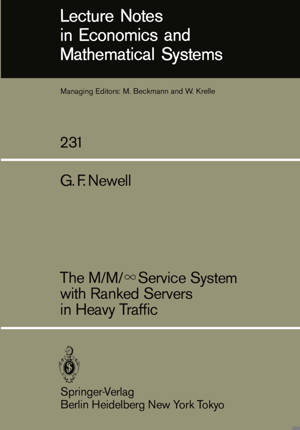
- Afhalen na 1 uur in een winkel met voorraad
- Gratis thuislevering in België vanaf € 30
- Ruim aanbod met 7 miljoen producten
- Afhalen na 1 uur in een winkel met voorraad
- Gratis thuislevering in België vanaf € 30
- Ruim aanbod met 7 miljoen producten
Zoeken
Omschrijving
We are concerned here with a service facility consisting of a large (- finite) number of servers in parallel. The service times for all servers are identical, but there is a preferential ordering of the servers. Each newly arriving customer enters the lowest ranked available server and remains there until his service is completed. It is assumed that customers arrive according to a Poisson process of rate A, that all servers have exponentially distributed service times with rate and that a = A/ is large compared with 1. Generally, we are concerned with the stochastic properties of the random function N(s, t) describing the number of busy servers among the first s ordered servers at time t. Most of the analysis is motivated by special applications of this model to telephone traffic. If one has a brunk line with s primary channels, but a large number (00) of secondary (overflow) channels, each newly arriving customer is assigned to one of the primary channels if any are free; otherwise, he is assigned to a secondary channel. The primary and secondary channels themselves could have a preferential ordering. For some purposes, it is convenient to imagine that they did even if an ordering is irrelevant.
Specificaties
Betrokkenen
- Auteur(s):
- Uitgeverij:
Inhoud
- Aantal bladzijden:
- 129
- Taal:
- Engels
- Reeks:
- Reeksnummer:
- nr. 231
Eigenschappen
- Productcode (EAN):
- 9783540133773
- Verschijningsdatum:
- 1/09/1984
- Uitvoering:
- Paperback
- Formaat:
- Trade paperback (VS)
- Afmetingen:
- 170 mm x 244 mm
- Gewicht:
- 240 g

Alleen bij Standaard Boekhandel
+ 105 punten op je klantenkaart van Standaard Boekhandel
Beoordelingen
We publiceren alleen reviews die voldoen aan de voorwaarden voor reviews. Bekijk onze voorwaarden voor reviews.











